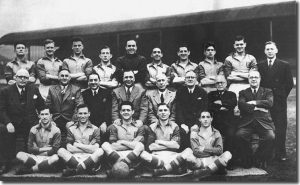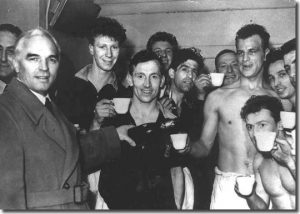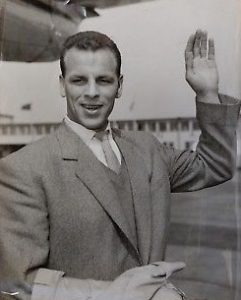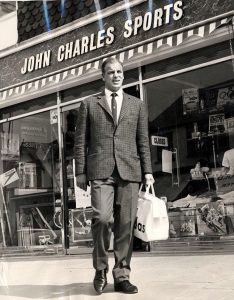THE JOHN CHARLES STORY
BY Vince Cooper
THE question: ‘Who was the greatest footballer of all time?’ is pretty much impossible to answer. As you trawl through the beautiful game’s history it will change from era to era and it tends to be those you loved during your own formative years when it comes down to each individual’s choice.
There were certainly those back in the day who firmly believed there’d never be another Steve Bloomer, or Dixie Dean whilst those of later generations would marvel at the wing skills and trickery of Stanley Matthews and Tom Finney and there was also the tantalising unfulfilled potential of the mighty Duncan Edwards, a player tragic circumstances never allowed the public to see the best of.
Move forward to the 1960s and many can, and often still do, make a case for Jimmy Greaves as the treated goalscorer of all time whilst the broadening of football to into a global game has added the likes of Pele, Yashin, Moore, Beckenbauer, Cruyff, Maradona, Messi, Ronaldo and Co. into the discussion.
But, great players as they all undoubtedly are, none of those mentioned above can lay claim to be a true world-class star in two distinct and very different positions (although it does seem that Edwards might have been capable of it). The only man to tick those specific boxes came from South Wales.
William John Charles was born in Alice Street, Cwmbwrla, near Swansea in 1931 and was the eldest son – and second child – of Ned, a steelworker who had played as an amateur with Swansea Town, and Lillian.
After John had shown promise as a cricketer as well as on the football pitch, he decided to follow in his dad’s footsteps, joining the groundstaff at Vetch Field. It didn’t take long for him to make an impression and after appearing in just one senior Welsh League match he was spotted by a Leeds United scout Jack Pickard who had watched him in training and playing at left-half for Gendros, a local team, and invited him, along with fellow youngsters Bobby Hennings and Harry Griffiths, to Elland Road for a trial.
John went despite his mum saying initially that he couldn’t because he didn’t have a passport and he spent a month at the club in late 1948 after which Leeds quickly moved to snap him up, offering him a £10 signing-on fee, £6 per week and a new suit and overcoat as a bonus.
He moved to Yorkshire in January 1949 as a 17-year-old. The Leeds manager was Major Frank Buckley who, during his time with Wolves had helped develop players like Billy Wright and Stan Cullis and he initially tried Charles in various positions, with a dozen games at right-back to start, while playing for Leeds reserves. Then in a Yorkshire League match against Barnsley reserves he was switched to centre-half for as John would later call it; “a turning point in my career.
”I discovered that I enjoyed playing at centre-half more than wing-half or full-back. Centre-half, I felt, was my natural position”.

A young John
Three months after arriving, and still eight months before his 18th birthday, Charles made his first-team debut at centre-half in a friendly against Queen of the South. He marked Billy Houliston who had played for Scotland against England 10 days before and, according to reports, had ‘run the English defence ragged’ in a 3-1 win. The game finished goalless and afterwards Houliston paid the young novice a massive compliment calling him; ‘the best centre-half I’ve ever played against’.
A week later Charles made his league debut, against Blackburn Rovers, again appearing at centre-half. The match finished goalless with the Yorkshire Post reporting that; ‘There could be nothing but satisfaction for United in the boy’s form’. He was in to stay and didn’t miss a match for Leeds after his debut apart from injuries, international calls and National Service.

John’s first season at Leeds
That call to join up came In 1950 and Charles served with the 12th Royal Lancers in Carlisle. His regiment allowed him to carry on playing for Leeds, on the understanding that he also turned out for them. He did so, and did so successfully with his team winning the Army Cup.
In March of the same year, at the age of just 18, Charles was called up for his Wales debut and became the youngest player to play for the country to that point, a record eventually broken by Ryan Giggs.
Much heralded beforehand and touted as the future of Welsh football, he played against Northern Ireland at Wrexham’s Racecourse Ground alongside players who, until then, had been his heroes. He made a nervy debut in a goalless draw and perhaps unsurprisingly, soon lost his place in the team to the more experienced Roy Daniel of Arsenal.
Although his potential was there for all to see, Charles himself knew that there was still work to be done. “I didn’t have it all there – I had to practice a lot I can assure you”, he would later recall. In this he found the perfect mentor in Buckley. “ I would go down the back of the big stand with Major Buckley and keep hitting and hitting the ball.
”Throughout the three months summer break I was working every day at jumping. When I first came I only used to jump a foot off the ground. That’s how I improved”.
Despite his commanding physique Charles was still coming to terms with the senior game. He got another chance with his national team the following year against Switzerland but again looked shaky as the Welsh won 3-2 having led 3-0 at one stage. That led to a two-year absence from the Welsh line-up.

Leeds days
Towards the end of the 1950-51 season Leeds were hit by injuries to their first and second choice centre-forwards soMajor Buckley made the fateful decision to switch Charles to centre-forward. The move was inspired with two goals in his second start there but Buckley soon had him back in defence again where the team had more need and he played there both before and after undergoing a cartilage operation which cost the player a large chunk of the 1951-52 campaign.
As the 1952-53 campaign got underway Major Buckley was still using his protege in defence but he gave him another go up front in a West Riding Senior cup tie against Halifax Town and a pair of goals there convinced that the future of the player he had already called; ‘The most brilliant association footballer in the game today’ was at the point of attack rather than in the heart of defence.
In the next 29 games Charles bagged an astonishing 26 goals and won back his place in the Welsh team this time as a forward scoring twice and making the other in the 3-2 win over Northern Ireland.

John of Wales, Bobby Robson of England
For Wales he was now regularly picked to lead the attack although there were times during matches when he was to be found back helping out the defence. As Bobby Robson, an international opponent would later say when comparing him to the all-time greats; “He was right up there with the very, very best. Pele, Maradona, Di Stefano, Cruyff, Best. But how many of them were world class in two positions? The answer to that is easy. None of them”.

Charles chats with Leeds manager Raich Carter
But despite John banging in the goals for his team Leeds were stuck in the mid-table obscurity of 10th, Major Buckley quit as manager.
There is little doubt that the loss of his biggest supporter could have made life difficult for the youngster but fortunately for him, Buckley’s replacement had just as much belief in John as his predecessor.
As he had done previously at Hull City, former England striker Raich Carter took over from Buckley and he immediately made it clear that he was a big fan of the Welshman. However, the feeling wasn’t completely reciprocated with Charles often complaining that his manager cared for nobody’s opinion but his own.
Matters came to a head in the early stages of the 1954-55 season when Charles, who had been pushed back to centre-half and had already been the subject of a couple of bids from Cardiff City, handed in a transfer request claiming that he was; ‘anxious to experience First Division football’.
Cardiff bid again, Arsenal and Chelsea were also interested but Leeds, despite having financial woes of their own to contend with refused to let their star man go even when the money offered rose above £50,000.
Instead, Carter made Charles captain and after a poor start to the season, Leeds put together a decent run which saw them climb the table and give fans hope for 1955-56.
And that hope was fulfilled. The start of the season saw Charles deployed at right half with Jack Charlton now wearing number five. Eight games in and the lack of firepower was blatant so Carter switch his skipper to centre-forward. A flurry of goals from the skipper saw United climb the charts and on the final day of the campaign they visited the manager’s old club Hull City knowing that a win would equal promotion.

Celebrating promotion
Charles gave his team the lead but City equalised. When Leeds were awarded a penalty in the second half their captain stepped up and buried it putting them back in front. Two late goals from Harold Brook wrapped things up so Charles would get his chance on the big stage with United.

“The finest Centre-forward I have met” Billy Wright
In October of 1955 Wales faced England at Cardiff having not beaten their neighbours for 17 years. Charles was back at centre-half for the fixture and he lined up alongside brother Mel who had made his debut earlier that year when John played up front and scored a hat-trick in a 3-2 win over Northern Ireland in Belfast.

John with his Wales teammates
At Ninian Park, Wales scored twice, through Derek Tapscott and Cliff Jones, in a five-minute spell just before half-time. England fought back in the second period and John, in an otherwise brilliant display where he marked Nat Lofthouse out of the game, put through his own net to give the English hope, but the Welsh held on to record a famous victory.
The following month Wales, with both brothers again in the line-up, met Austria in a game that became known at ‘The Battle of Wrexham’. An Austrian player committed a particularly nasty foul on Mel forcing him to be stretchered off with 15 minutes remaining. The mild-mannered John, in a rare act of temper, lifted the offending Austrian off the floor and said; “if you ever do that to my brother again I’ll bloody kill you!” This was, in all likelihood, the closest Charles ever came to being booked or sent-off in a career where he suffered plenty of provocation but rose above it all.
The 1956-57 season saw Leeds holding onto their top flight place but it was becoming increasingly hard for them to hang on to their prize asset and things only got more difficult in September 1956 when Elland Road’s Main Stand, under-insured, burned down after an electrical fault.
Still the man The Times described as being; “Hewn as it were, from the granite of some Welsh mountainside” was undeterred. He picked his team up and carried them to a creditable 8th position, top scoring in the First Division with 38 of his team’s 72 goals.
The press were full of praise for the Leeds skipper with some suggesting they were a one-man team, although the player himself was adamant that his teammates deserved equal billing. “It is absolutely scandalous to suggest that I did all the work for the Leeds United team,” he said. “I had many fine colleagues and teammates, and but for their unstinting loyalty and assistance I would never have gained my position in football and neither would the club”.

Leeds United v Sunderland. Don Revie and John meet
The final Elland Road match of the season, which many felt would be John’s last match for a club drowning in debt from the after-effects of the fire, was against a Sunderland side battling for survival at the foot of the table. Charles signed off in style, scoring twice in a 3-1 win
Charles was again being coveted by a number of clubs with Sunderland and Manchester United now joining his previous suitors in the hunt for his signature but Leeds held firm. However, the damage done in the fire left the club with little choice other than to sell him although they insisted it would not be to another Football League club.

Netting for Leeds
In 1956 22-year-old Umberto Agnelli took over as the president of Juventus. The Agnelli family, owners of the giant Fiat motor company, had been involved with the club since their highly successful period in the 1930s and Umberto was keen to restore the club to those glory days when they won five consecutive Serie A crowns.
Leeds were still reluctant to let their star leave. But the reality was that the money was needed as ground rebuilding costs soared. Charles was told by his manager that Real Madrid were looking at him, then Lazio.
But it was Agnelli who flew to Belfast to watch the star play for his country against Northern Ireland and then flew back to Leeds, ready to bid.

Off to Italy
Given their problems, Leeds found the offer of £65,000 impossible to refuse. And Agnelli was able to do the same with Charles, with a reported £10,000 signing-on fee and a home in the Turin hills for Charles, his wife and three children.
In Turin, Juve had needed to overcome one final obstacle before they could confirm their new signing. The club needed to preserve their top flight status to be allowed to sign the Welshman and with some difficulty, they managed to do so.

With Omar Sivori and Giampiero Boniperti; ‘The Holy Trident’.
At Juve, Charles was one third of an attacking trio which many still feel ranks as the best the Italian giants have fielded. Argentine Omar Sívori and captain Giampiero Boniperti completed the ‘Holy Trident’ and this threesome is still revered on the streets of the city over 60 years later.
Despite having difficulties adapting to the Italian lifestyle (“The first time I ate spaghetti it went everywhere but down my bloody throat” he would recall later), Charles quickly made his mark on the pitch.

Signing for fans
On his debut against Hellas Verona he scored the winner as Juve prevailed 3-2 in the opening game of the new season. He would go on to score the winning goal in his first three games for his new club and, just like that, Juve fans had a new hero.
The big Welshman’s belief in fair-play was hard for the Italian supporters to comprehend. And teammate Sívori would often be maddened to see Charles put the ball out of play (one time when clean through on goal with the ‘keeper laying prone on the floor) when an opponent was injured.
In that first season, the attacking trio scored 50 goals between them, with Charles grabbing the lion’s share, finding the back of the net 28 times as ‘La Vecchia Signora’ cruised to the Serie A crown, finishing eight points clear of Fiorentina.

‘The Gentle Giant’.
Charles unsurprisingly claimed Footballer of the Year honours in his adopted homeland and that summer, after initially refusing to release the player, Juve eventually relented and allowed him to join his Welsh teammates at the World Cup in Sweden.

Wales line up
In Sweden, brother Mel later admitted that the sight of John arriving at the hotel (after being stranded at the airport and having to make his own way there) gave his teammates a huge lift. Wales drew all three of their group matches with Charles scoring the leveller in the opening game against Hungary. The three draws forced a playoff match with the Hungarians and despite their star man being kicked all over the pitch, goals from Terry Medwin and Ivor Allchurch saw them make the quarter final.
Sadly, Charles was forced to miss the last-eight match against Brazil through injury and Pele’s goal eliminated the Welsh with many claiming that had Charles been fit for duty it would have been them and not the eventual winners who went through.
After the World Cup Charles continued to play occasionally for his country although Juventus were often reluctant to release him for international duty. He would don the national shirt a total of 38 times, scoring 15 goals.

‘Il Gigante Buono’
Back in Italy, the Welshman enjoyed another fine season, finding the back of the net 19 times but Juve slumped to a 4th-place finish and were humiliated in the European Cup, a competition they never seemed to take seriously at the time. They fell 7-0 on aggregate to Wiener Sport-Club of Austria. Partial redemption came with a 4-1 win over Inter in the Coppa Italia where Charles scored the opener.
In the summer of 1959 ‘Il Gigante Buono’ (The Gentle Giant) signed a new contract – Agnelli joked that Fiat would need to sell a lot more cars to pay for it – but the Welshman rewarded the club as he (23) and Sívori (28) combined for 51 goals and the club won the Serie A – Coppa Italia double.

With Italian League teammates Hitchens, Law and Baker in Scotland
His success started an exodus of top British striking talent to Italy and before long Gerry Hitchens, Denis Law, Joe Baker and Jimmy Greaves had all tried their hand in Serie A.
Juventus won the title again in 1960-61 and Charles enjoyed one more season in Turin, although he was troubled by injuries After that, the abolition of the minimum-wage in England, homesickness and mounting problems with his marriage brought him back to Leeds, for a fee of £53,000. The Italian adventure had seen him score 93 goals in 155 games and become a hero throughout the country. He chose to return to his former club, a move he would later describe as ‘the biggest mistake of my life’.

Back to Leeds
After just 91 days, and 11 games under new boss Don Revie, it was clear that the move wasn’t working out. Charles looked to return to Serie A but with Juventus still miffed that he had left and refusing to take him back, he headed instead for Roma who paid £70,000 to sign him. But Charles was by now beset by problems, financial, personal and physical and he appeared just 10 times for the team from the Italian capital before another move, this time to his home capital of Cardiff.
Charles was approaching his 32nd birthday by the time he joined The Bluebirds and he spent three seasons at Ninian Park. The first two were fine with a total of 64 games, but the third was disappointing with a mere eight starts and his advancing age plus the years of harsh treatment meted out by defenders were clearly slowing him.
In 1966 Charles moved to Southern League Hereford United, initially as a player before taking on player-manager duties. After six years at Edgar Street where he laid the groundwork for the side that would eventually win league status he next moved to Merthyr Tydfil, again taking on the dual role and playing on until he was 41. Then his career came full circle and with a return to Swansea as youth team manager. In 1974 when manager Harry Gregg resigned he left the club and had a short spell coaching in Ontario, Canada before leaving football for good.

John Charles Sports
A current player of his standard would undoubtedly retire with no financial worries but a number of failed business ventures including a hotel, a sports shop and two pubs meant he had to be bailed out by Leeds chairman Leslie Silver after being pursued for unpaid rates.
It is fair to say his later-life business skills didn’t match those he showed in the pitch but Charles remained revered in Turin as well as Leeds where he was awarded a joint testimonial with Bobby Collins in 1988, and where the stand his transfer helped pay for the rebuilding of is now fittingly called ‘The John Charles Stand’.
Football in general has also recognised him as one of the true greats. In 2001 he was awarded the CBE for services to Association football and the following year he was made vice-president of the Football Association of Wales.
In 2002, Charles and second wife Glenda were invited to the Stadio delle Allpi and were given a standing ovation as they walked to the centre circle.
Juventus laud him as their ‘best ever’ whilst Leeds United named their main stand after him. There can be few players who are so revered by two sets of fans in two countries.
And just as he was loved by fans, John was also held in the highest regard by his opponents. Nat Lofthouse said John was the best centre-half he ever played whilst Billy Wright said the same of him as a centre-forward.
In January 2004 he suffered a heart attack and, a month later, passed away in Wakefield, West Yorkshire. His ashes were bequeathed by his widow to the city of Swansea.
‘The Gentle Giant’ he was known as. His attitude towards opponents earned the first part of that name, his ability meant that the second part related to much more than just his size. John Charles remains and will surely continue to be a towering presence in the footballing D.N.A. of Leeds United, Juventus and Wales

